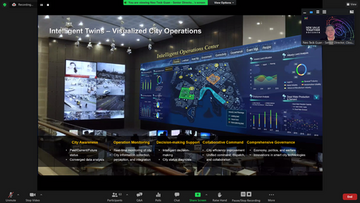Huawei participates in National Digital Consortia on January 11th to share innovative technologies and global best practices and cases that enable the fastest route to the digitalization of economies. The National Digital Consortia is organized by Information and Communication Technology Agency of Sri Lanka (ICTA) in partnership with FITIS, SLASSCOM, BCS, CSSL. The event also aimed at building ties between multinational organizations, local businesses, local government, and encouraged the leading technology giants to be part of Sri Lanka’s digital transformation.
As one of the world-leading ICT technology providers, Huawei joins the ‘National Digital Consortia’ together with esteemed global tech giants to present the latest innovative solutions, services, and shared insights on trends and cutting-edge technologies in the global tech and ICT industry.
During the session, Huawei contributes knowledge, expertise, and industry know-how to the course of the digital transformation of Sri Lanka together with ICTA. By sharing the ongoing trends in the technology landscape, Huawei looks forward to cooperating with partners in Sri Lanka to develop the local technology ecosystem.
In the world we live today, technology is developing faster than we could have ever imagined. Digital technologies such as 5G, cloud, and AI are constantly being pushed to their limits, advancing in leaps and bounds. And in this background, the ‘National Digital Consortia’ event was attended by businesses within the technology industry, government institutions, academia, and leading technology enthusiasts, ICT students who are keen to explore cutting-edge innovations in the ICT era.
Emerging towards a Digital Economy in Future
Delivering the Keynote during the second day afternoon sessions Chief Digital Officer at Huawei Michael Macdonald went on to elaborate that The fourth industrial revolution featuring intelligent technology is faster on its way and that new technologies such as AI, IoT, 5G, and biological engineering will be integrated into our society and impact global macro trends.
“Intelligent technology will promote sustainable development in countries such as Sri Lanka and become a new driver for economic growth. It will help build smart cities, drive the digital transformation of industries, and improve consumer experiences. As a key engine for the fourth industrial revolution, intelligent technology will promote global advancement and development” Macdonald explained adding that as AI develops, ICT will empower the transformation from the digital economy to an intelligent economy. According to him, initially, AI can optimize the cooperation and performance of ICT infrastructure, and secondly, AI can help improve decision-making efficiency and quality. These two advantages brought by AI will facilitate the digital transformation of the entire society and economies, and give birth to new products and services.
Macdonald said that the policymakers and industry leaders are realizing that digital transformation helps drive economic development and productivity. He said that The fast development of 5G and AI will profoundly change our lives and the world, and this relies on investing in ICT infrastructure and ICT applications.
He further highlighted that from the perspective of national strategies, Huawei finds that 5G and AI have become focus areas of major countries in the high-tech race. According to him China, the US, South Korea, Japan, and European countries are advancing their 5G and AI strategies and policies, to have strategic advantages in these areas through national strategies and improved competitiveness in key industries.
Macdonald suggested that a developing and emerging nation such as Sri Lanka could explore investing more in ICT, which is the most effective way to stimulate GDP growth. “Some believe that policy-makers and end-users will benefit the most from an intelligent connectivity ecosystem. However, from an ROI perspective, the benefits gained by various countries and industries may be more balanced than what we expected. There is a misunderstanding that intelligent connectivity will only benefit countries that own the most advanced technologies. The emergence of intelligent connectivity is a turning point for global digital transformation” Macdonald said adding that intelligent connectivity has great potential for economic growth, though it is still nascent. Intelligent connectivity will dramatically impact all aspects of our society and economy through innovative solutions, new business models, and emerging technologies.
Making Smarter Governments with Technology and 5G’s contribution to Digital Economy
Speaking at the event Neo Teck Guan – Senior Director Cloud Strategy and Consulting Huawei Cloud Asia Pacific Region highlighted that the spread of new digital infrastructure will make for better management of the urban environment, with more efficient use of resources and more effective city governance. He pointed out that the centralized digital platforms for government processes and services will make government services user-friendly and easier to access. This will help create more comfortable and livable cities.
Sharing global experience and best practices he went on to elaborate that the United States was the first to propose to implement a systematic national 5G strategy and is now carrying out 5G R&D, commercial application, and national security assurance. It has launched the American AI Initiative and will rely on five pillars to advance AI, including promoting investments, providing resources, developing standards, empowering AI workers, and encouraging international cooperation.
Neo Teck Guan concluded by looking through the digital future from the perspective of smart governance: “Digital technologies ranging from digital infrastructure, cloud computing, and blockchain will make cities more livable and civic governance more efficient in the years to come. Enterprises from countless industries will use more productive machines, such as collaborative robots, autonomous mobile robots, and digital employees”
Cloud Facilitation for Digital Transformation
Whilst we are living in a world in continuous evolution, all companies need to drive their activity to new forms of technology, this is why Digital Transformation becomes a means of survival. In this revolution, cloud computing has a key role according to Roy Chen Qi – Director Public Sector – Government & Education & Healthcare Huawei Cloud APAC. He points out that the cloud becomes the catalyst for this transformation and that nowadays every company measures its performance through customer experience, a cloud-enabled and cloud-delivered business model supports organizations to adopt newer channels to offer high-level customer experience by differentiating its strategy and solutions over the current market competitors.
During the sessions Chen Qi highlighted that data is not saved on physical devices, but in the cloud, which helps governments and businesses to better manage the administration, to streamline processes, improve productivity, optimize costs and enhance customer digital experience.
He suggested that to succeed for economies such as Sri Lanka during this time of economic volatility and in a post-pandemic world, state-owned enterprises and companies will need to embrace resilience and agility across their entire operations and participate in digital ecosystems to foster innovation and create new revenue streams. This requires a rethink of IT infrastructure and ecosystem strategies not only to solve immediate problems, such as enabling Cloud‐based digital infrastructure enables access to digital ecosystems to accelerate such transformation, provide flexibility and choice, create new digital value chains and grow revenues. While cloud is the foundation to enable Digital Transformation, the adoption of cloud is multifaceted.
Digital IT infrastructure requires the skillful and efficient deployment of multiple cloud models that combine private, public and hybrid architectures, across multiple locations, at the core and/or at the edge, to comply with an array of unique business and technology requirements such as security, latency, scalability, and compliance. Qi said that connectivity and networking infrastructure are critical to the success of implementing and operating these distributed cloud architectures. Nevertheless, the speed of change is so fast that it is increasingly difficult for organizations to go to market relying solely on their internal resources. Qi also suggested that Digital platforms combined with vibrant ecosystems can help to leverage the digital skills gap and enable innovation at speed. These digital ecosystems will enable governments and organizations to access the resources they need quickly while offering a springboard for new partnerships to accelerate the launch of new products or services.
Low-Carbon Footprint, and Green Energy with Efficiency through Digital Power
Speaking on Digital Energy Technologies that reduce Carbon footprint by Sanjay Kumar Sainani – Global SVP & CTO Data Centre Business Huawei Technologies said that Huawei Digital Power solutions strive to help carriers improve efficiency and smarten up facilities.
“Our solutions help both telecom and tower carriers simplify facility deployment, improve power reliability, increase energy efficiency and make O&M smart, enable ICT networks to evolve to 5G and cloud smoothly,” he said adding that ICT global digital enabler Huawei is committed to decarbonizing and spearheading the energy transition. The actions the company took during the years to come will be instrumental in shaping a sustainable, resilient, net-zero emissions economy.
“At Huawei, we realize the urgency of ensuring an affordable, reliable, sustainable, and modern supply of energy for all by 2030. We are thus looking forward to working with Sri Lankan organizations members to support the energy transition in South Asia and foster collaboration and cooperation to achieve the goals of the twin digital and green transition pursued. We will work together to integrate digital and power electronics technologies to drive energy revolution for a better, greener future” Sanjay Kumar Sainani said.
ICT Talent Development for Digital Transformation
Indika De Zoysa – Vice President Huawei Sri Lanka speaking on the latest initiatives by Huawei that supports the digital transformation of Sri Lanka said that in recent two years company has extended ICT talents cultivation initiative to a larger scale, named Huawei Asia Pacific Academy. Accordingly, Huawei is focusing on 3 domains Public awareness, ICT Vocational Training, and Joint innovation with Sri Lanka universities, to enhance knowledge transfer, promote a greater understanding of and interest in the telecommunications sector, and improve and encourage regional building and participation in the digital community.
Accordingly with the aim of “Cultivating a Talent Ecosystem for Inclusive Digital Prosperity”, to explore collaborative initiatives for closing the digital skill gaps and facilitating the digital transformation in the post-pandemic economic recovery in Sri Lanka Huawei had launched several initiatives including the largest Huawei ICT Academy and Innovation Lab in the country, at the University of Moratuwa, NAITA-Huawei ICT Academy that contributes to enhancing vocational education and training for the youth in the telecommunication sector with hardware installation skills along with Huawei’s certification system which is the only certification system that covers all ICT technologies in today’s world. Further, Huawei’s flagship CSR program Seeds For The Future to date, has benefitted a total of 74 Sri Lanka university talents who participated and looking forward for 7th year in Sri Lanka, with 2022, the program is now an annual symbolic project in Sri Lanka’s ICT and education sector, carried out by Huawei in cooperation with the Education Ministry in Sri Lanka. Zoysa further added that Huawei is committed to investing over Rs. 600 million for the next 5 years for digital talent cultivation in Sri Lanka to nurture required future talent for the digital transformation in the country.
Photo Captions
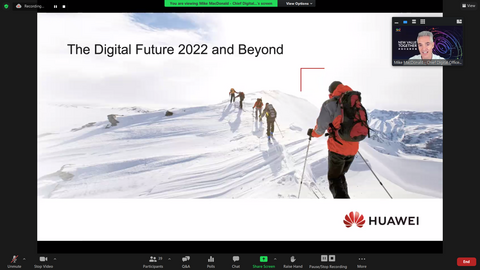
1. Chief Digital Officer at Huawei Michael Macdonald presenting on the Digital Future Beyond 2022
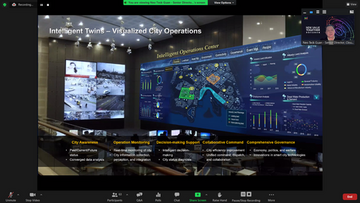
2. Neo Teck Guan – Senior Director Cloud Strategy and Consulting Huawei Cloud Asia Pacific Region on Making Government Smarter with Technology
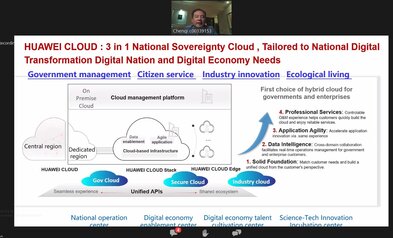
3. Roy Chen Qi – Director Public Sector – Government, Education & Healthcare Huawei Cloud APAC on Huawei Cloud that facilitate National Digital Transformation Solution
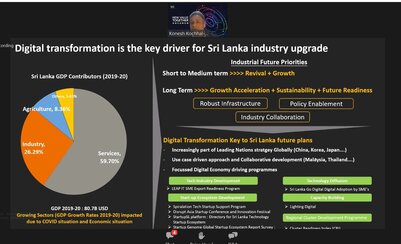
4. Konesh Kochhal – Director Industry Ecosystem Engagements Huawei APAC on Accelerating Digital Economy Development with 5G
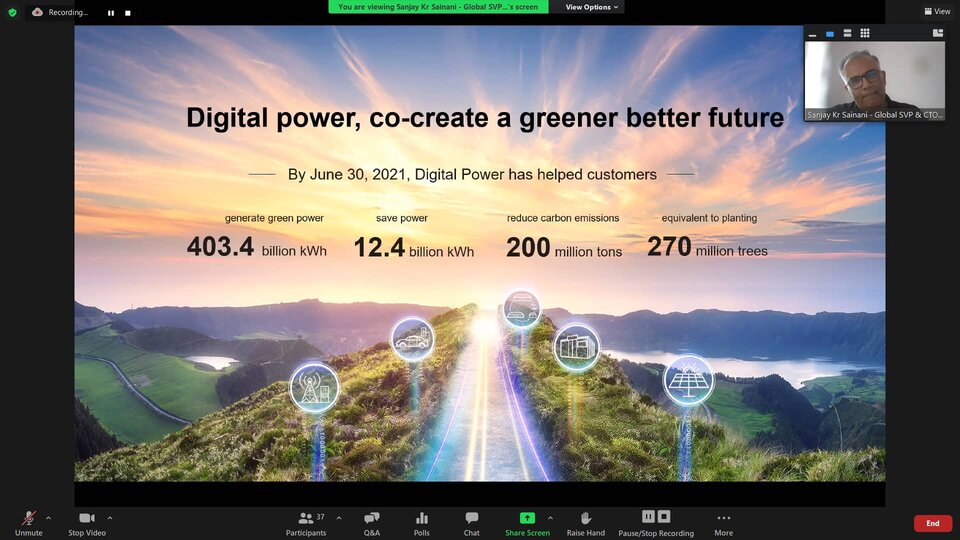
5. Sanjay Kumar Sainani – Global SVP & CTO Data Centre Business Huawei Technologies Digital Energy Technologies to reduce Carbon footprint
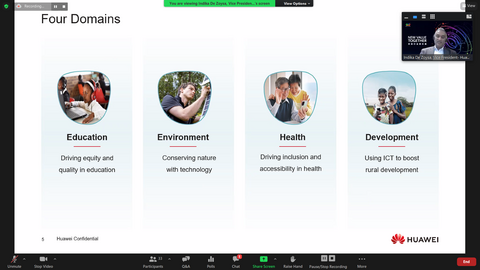
6. Indika De Zoysa – Vice President Huawei Sri Lanka on Tech4All initiatives of Huawei
